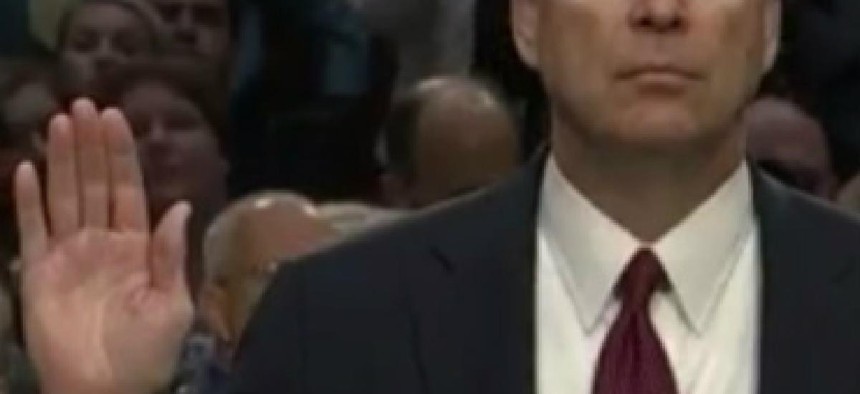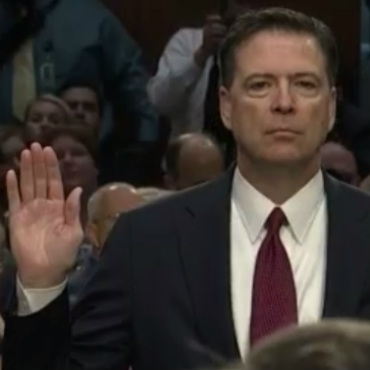Comey warns Russia will be back

While many questions remained unanswered after the testimony of former FBI Director James Comey, he made one point abundantly clear: Russia interfered in the 2016 election, and it will do so again.

Former FBI Director James Comey is sworn in before testifying before the Senate Select Committee on Intelligence on June 8, 2017.
Former FBI Director James Comey's highly anticipated testimony before the Senate Intelligence Committee answered some questions, raised others and left observers reading between the lines. But on one point, there was no equivocation: Russia meddled in U.S. politics.
"There should be no fuzz on this whatsoever. The Russians interfered in our election," Comey said during the nearly three-hour hearing that focused heavily on his interactions with President Donald Trump and whether Trump attempted to interfere with any FBI investigations.
"They did it with purpose," he said. "They did it with sophistication. They did it with overwhelming technical efforts, and it was an active-measure campaign driven from the top of the government."
"It is a high confidence judgment of the entire intelligence community and the members of this committee [that] have seen the intelligence; it is not a close call," he added. "That's about as unfake as you can possibly get and is very, very serious."
Comey stated he had no doubt that the Russian government was behind the hacking of Democratic Party offices and the leaking of stolen data. In addition, he confirmed that the Russian government hacked into state voter files, and he also stated he had seen no evidence as while serving as FBI director that a single vote cast in the 2016 election was changed as the result of tampering.
The former director stated that he initially became aware of Russian hacking efforts in the summer of 2015. At that time, Russia was targeting governmental, non-governmental and near-governmental agencies -- possibly more than a thousand different organizations.
He said the bureau undertook efforts to notify all the victims of "this massive spear-phishing campaign."
"Then there was a series of continuing interactions with entities through the rest of '15 into '16. And throughout '16, the administration was trying to decide how to respond to the intrusion activity it saw," Comey added.
Comey reconfirmed what he and others in the intelligence community had previously stated: that they did not receive direct access to Democratic Party servers to conduct forensic analysis and instead received data from a cybersecurity firm, which was later identified as CrowdStrike.
"What was briefed to me by my folks … at the time is that they had gotten the information from the private party that they needed to understand the intrusion by the spring of 2016," Comey said.
"The reason this is such a big deal is we have this big messy wonderful country where we fight with each other all the time, but nobody tells us what to think, what to fight about, what to vote for except other Americans," he said.
"But we're talking about a foreign government that -- using technical intrusion, lots of other methods -- tried to shape the way we think, we vote, we act," he added. "That is a big deal."
"They want to undermine our credibility in the face of the world … they're going to try to run it down and dirty it up as much as possible," he said, adding that Russia will be back.
But what was of greater interest to many senators was not so much what Russia did, but the state of the investigation into Russia's activities, in particular whether or not the president attempted to influence Comey's investigation in any way.
In his prepared testimony that the committee released the day before the hearing, Comey detailed his in-person and phone conversations with Trump.
His takeaways from the meetings and conversations was that Trump wanted him to pledge "loyalty" and that the president implied Comey's continued tenure was contingent on how he conducted the investigation into whether Trump or his associates colluded with Russia in any way.
Comey also stated that he interpreted one conversation as the president ordering him to drop the investigation into whether former National Security Advisor Michael Flynn had violated any laws with his conversations with Russian officials and statements to the vice president.
"I took it as a direction," Comey said. "I didn't obey that, but that's the way I took it."
Though Comey did confirm what Trump has claimed -- that the former director did tell the president he was not the subject of an open counterintelligence investigation -- Comey also stated that Trump said it would be a positive thing for the overall Russia investigation to continue and that the president said "if some of my satellites did something wrong, it would be good to find that out."
The former FBI director did state that Flynn was in legal jeopardy but that it was not for him to determine whether Trump was trying to obstruct justice.
Comey frequently declined to answer questions, stating that answers involved classified material, or that they were the purview of Robert Mueller, the former FBI director currently serving as special counsel on the Russia investigation at the Justice Department.
Trump's personal attorney delivered a full-throated statement shortly after the hearing and flatly denied that the president asked Comey for loyalty or to let Michael Flynn go. Marc Kasowitz also suggested that Comey should be investigated for leaking his own memos of his conversations with the president.
Comey testified that after Trump tweeted a threat that he had tapes of their conversations, Comey asked a friend to leak one of his unclassified memos to the press in hopes it would trigger the appointment of a special counsel.
NEXT STORY: U.S. faces challenges tracking cryptocurrencies


